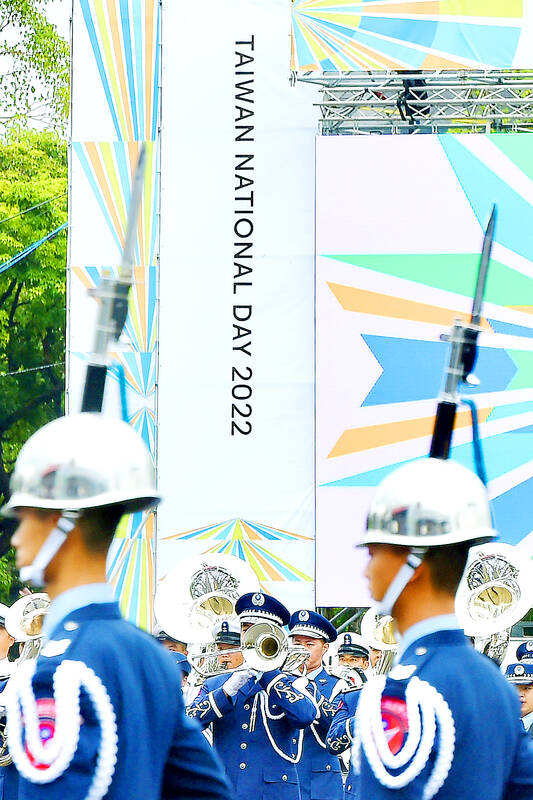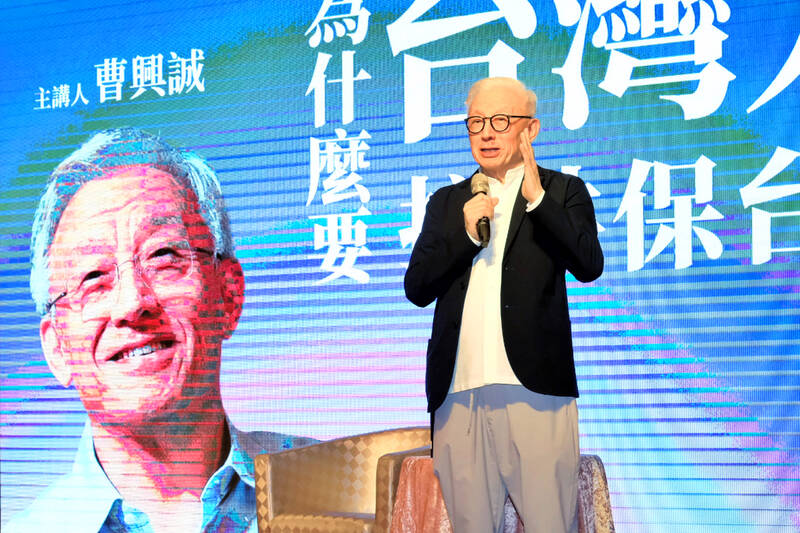Business tycoon Robert Tsao (曹興誠) on Friday chided former president Ma Ying-jeou (馬英九) for opposing the use of the term “Taiwan National Day” in material promoting Double Ten National Day celebrations.
Tsao said the former president, of the Chinese Nationalist Party (KMT), identifies with China instead of with Taiwan.
Tsao’s remarks came after Ma said President Tsai Ing-wen (蔡英文) should stop using “Taiwan National Day” and that any such reference should be removed from promotional material and banners for the celebrations.

Photo: Tu Chien-jung, Taipei Times
“The term has not been used before by previous governments,” Ma said. “I had no idea the name ‘Republic of China’ (ROC) has been changed to ‘Taiwan.’”
Tsao wrote on social media that Ma believes “both sides of the Taiwan Strait belong to one China” and that “no territory can be separated from the motherland.”
Tsao called the former president’s view “obsolete.”

Photo: CNA
“I want to ask this Chinese person, Ma Ying-jeou, how much longer will you be bullying Taiwanese?” he wrote.
Ma is hostile toward Taiwanese independence, he added.
Tsao is the founder of semiconductor maker United Microelectronics Corp (UMC). He became a Singaporean national in 2011, in part because of lingering dismay over government restrictions on UMC’s ability to invest in China.
However, he has recently become a vocal critic of Beijing.
In the wake of large-scale military drills China launched around Taiwan after a visit to Taipei by US House of Representatives Speaker Nancy Pelosi in August, Tsao vowed to donate NT$3 billion (US$94.7 million) to help Taiwan bolster its defenses, including by setting up local militia units — or “black bear warriors” (黑熊戰士) — who would be trained in combat tactics, guerrilla warfare, cognitive warfare and first aid. He also pledged to fund the domestic production of 1 million combat drones.
“Under the former KMT regime led by Chiang Kai-shek (蔣介石) and later his son, ‘one China’ referred to the ROC, and it was illegal to advocate for the People’s Republic of China (PRC). Chiang viewed the PRC government as communist bandits and the sworn enemy who must be exterminated,” Tsao wrote.
“Nowadays, the PRC is threatening to exterminate the ROC,” Tsao wrote.
The hostility between the two governments stem from the Chinese Civil War, he wrote, adding that “Taiwanese have nothing to do with it.”
Taiwan should refer to itself more often as “Taiwan,” instead of using its official name, Tsao said.
It would help Taiwanese avoid falling “into the trap of the Chinese Civil War,” he wrote.
Ma opposes using “Taiwan” to refer to the nation and has on multiple occasions used the argument that “there is only one China” against it, Tsao wrote.
“This shows Ma is Chinese and that he colludes with the Chinese government to bully Taiwan,” Tsao added.
The ROC Constitution remaining in place in Taiwan “brings nothing but disaster,” Tsao added, adding that Ma is against drafting a new constitution.
“I want to ask Ma: Do you have any moral conscience in you?” he asked
Separately, Premier Su Tseng-chang (蘇貞昌) said most foreign diplomats based in Taiwan and visitors to the nation refer to it as Taiwan, instead of the ROC.
“The international community distinguishes us from China,” Su said.
When Taiwan refers to itself as the ROC in international forums, it might be mistaken as referring to China, he said.
As for Double Ten National Day, Su said there are multiple ways to refer to it.

A Taiwanese software developer has created a generative artificial intelligence (AI) model to help people use AI without exposing sensitive data, project head Huang Chung-hsiao (黃崇校) said yesterday. Huang, a 55-year-old coder leading a US-based team, said that concerns over data privacy and security in popular generative AIs such as ChatGPT and DeepSeek motivated him to develop a personal AI assistant named “Mei.” One of the biggest security flaws with cloud-based algorithms is that users are required to hand over personal information to access the service, giving developers the opportunity to mine user data, he said. For this reason, many government agencies and

The National Fire Agency on Thursday said a series of drills simulating a magnitude 8.5 earthquake would be held in September to enhance the government’s emergency response capabilities. Since earthquakes cannot be predicted, only by continuously promoting disaster prevention measures could Taiwan enhance its resilience to earthquakes, agency Director-General Hsiao Huan-chang (蕭煥章) said in a news release. The exercises would be held to mark annual National Disaster Prevention Day on Sept. 21, the aim of which is to test Taiwan’s preparedness and improve its earthquake resilience in case of a major temblor, Hsiao said. As part of those drills, an earthquake alert would

DEFENSE: The National Security Bureau promised to expand communication and intelligence cooperation with global partners and enhance its strategic analytical skills China has not only increased military exercises and “gray zone” tactics against Taiwan this year, but also continues to recruit military personnel for espionage, the National Security Bureau (NSB) said yesterday in a report to the Legislative Yuan. The bureau submitted the report ahead of NSB Director-General Tsai Ming-yen’s (蔡明彥) appearance before the Foreign and National Defense Committee today. Last year, the Chinese People’s Liberation Army (PLA) conducted “Joint Sword-2024A and B” military exercises targeting Taiwan and carried out 40 combat readiness patrols, the bureau said. In addition, Chinese military aircraft entered Taiwan’s airspace 3,070 times last year, up about

STRICTER ENFORCEMENT: Taipei authorities warned against drunk cycling after a sharp rise in riding under the influence, urging greater public awareness of its illegality Taipei authorities have issued a public warning urging people not to ride bicycles after consuming alcohol, following a sharp rise in riding under the influence (DUI) cases involving bicycles. Five hundred and seven people were charged with DUI last year while riding YouBikes, personal bicycles, or other self-propelled two-wheelers — a fourfold increase from the previous year, data released by the Taipei Police Department’s Traffic Division showed. Of these, 33 cases were considered severe enough to be prosecuted under “offenses against public safety,” the data showed. Under the Road Traffic Management and Penalty Act (道路交通管理處罰條例), bicycles — including YouBikes and other